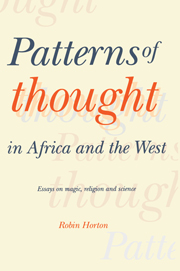8 - Paradox and explanation: a reply to Mr Skorupski
Published online by Cambridge University Press: 05 June 2012
Summary
The starting point of Mr Skorupski's searching critique is my contention that, in seeking out adequate instruments for the translation of Mrican religious discourse, we should give serious consideration to the potentialities of modern Western scientific discourse. He suggests that my preoccupation with scientific discourse in this context stems from my failure to consider other candidates for the translational job. His own view is that if we consider the candidacy, not only of scientific discourse, but also of modern Western religious discourse, we may find that the latter is more suited to our purposes.
In arguing his case, Skorupski focusses attention on the question of paradox. He maintains that, contrary to what I have claimed, the process of explanation in the sciences is not inherently paradoxical. Indeed, he says that such paradoxes as do arise during the course of theory-building are deliberately and speedily eliminated. On the other hand, he maintains that Western religious discourse is inherently paradoxical; and he produces some compelling evidence to show that, far from trying to eliminate paradox, the users of such discourse cultivate and even flaunt it. Finally, turning to a consideration of Mrican religious discourse, he suggests that, unlike scientific discourse and like modern Western religious discourse, it too is inherently paradoxical. He further suggests that, although Mrican religions are concerned, amongst other things, with the provision of explanations of the world and its working, neither their paradoxicality nor most of their other distinctive features can be related to this concern.
- Type
- Chapter
- Information
- Patterns of Thought in Africa and the WestEssays on Magic, Religion and Science, pp. 259 - 300Publisher: Cambridge University PressPrint publication year: 1993



